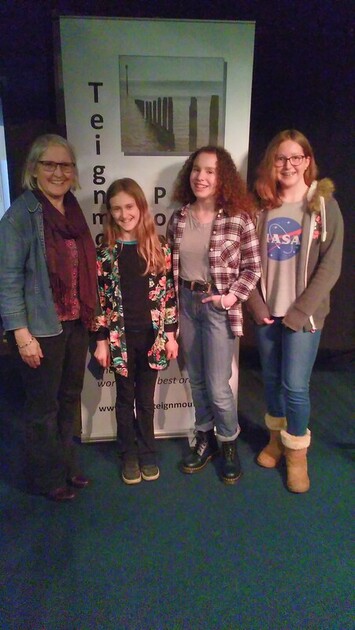TEIGNMOUTH POETRY FESTIVAL 2019 – COMPETITION RESULTS
YOUNG POETS’ COMPETITION
1st Prize: Rosie Crompton (Year 9, Trinity School): Stripped Back
2nd Prize: Sophie Tapp (Year 9, Community School): Look Up Into History
3rd Prize: Lottie Brown (Year 9, Trinity School): A Flower
Commended:
Archie Kent (Year 9, Trinity School): Racism
Ella Clark (Year 9, Trinity School): What Should You Fight For?
Eva Hunt (Year 9, Trinity School): Equality
Oliver Protheroe (Year 9, Trinity School): No Escape
Toby Roberts (Year 9, Trinity School): Poem
Hope Caines (Year 8, Trinity School): Ocean Poem
Matthew Hosking (Year 8, Trinity School): A Poem
11 and under Results:
1st Prize: Izzy MattesiniI (Age 11, Steiner School): Autumn
YOUNG POETS’ COMPETITION
1st Prize: Rosie Crompton (Year 9, Trinity School): Stripped Back
2nd Prize: Sophie Tapp (Year 9, Community School): Look Up Into History
3rd Prize: Lottie Brown (Year 9, Trinity School): A Flower
Commended:
Archie Kent (Year 9, Trinity School): Racism
Ella Clark (Year 9, Trinity School): What Should You Fight For?
Eva Hunt (Year 9, Trinity School): Equality
Oliver Protheroe (Year 9, Trinity School): No Escape
Toby Roberts (Year 9, Trinity School): Poem
Hope Caines (Year 8, Trinity School): Ocean Poem
Matthew Hosking (Year 8, Trinity School): A Poem
11 and under Results:
1st Prize: Izzy MattesiniI (Age 11, Steiner School): Autumn
(From left to right) Judge Annie Fisher, Izzy Mattesini, Rosie Crompton, Sophie Tapp photo Veronica Aaronson
Teignmouth Children’s Poetry Competition 2019: Judge’s Report
The poems submitted for this year’s competition impressed me with their strength of feeling. The poems had great energy, and I was struck by how all the poets, in their different ways, cared passionately about the world we live in. Some poems celebrated nature (autumn, Dartmoor, the ocean, the English weather, the night sky); some turned their attention to living creatures (dogs, butterflies, moths); others to people and friendships. Many of the poems addressed challenging issues: racism and issues of inequality, self-image, war and peace.
Some images from the poems have stayed in my mind: the poppy growing ‘on scarred ground’; the image of autumn as a golden wolf howling; of stars as the teardrops of past centuries. Sometimes a very short, simple line had power because it was so obviously genuine and heart-felt. Take this brief opening line for example: My dogs are my life. A blunt final question sometimes worked in the same way: Why not achieve peace? Several poems used rhyme throughout and some combined this with humour. Rhymes worked best when they seemed unforced, and were necessary to the poem, as in Rosie Crompton’s poem:
Are you scared for your community
which you claim you try to protect?
Are you afraid it’ll affect your unity?
The most successful poems used subtle poetic techniques such as personification and alliteration (ponies prance and piptails dance) or used the sounds of words to create a feeling or mood, as in the description of mushrooms in one of Izzy Mattesini’s poems: Silent and shadow-filled they wait there in the dark.
No two poems were the same. Each had its own ‘voice’ which is something I always look for in a poem. I enjoyed reading each and every one, so thank you all very much for entering, and thanks to Teignmouth Festival for asking me to read and judge the competition poems.
Do read as much poetry as you can. It really is the best way to grow as a poet, and do keep writing – you have important things to say, and poetry is a great way to let your voice be heard.
Annie Fisher
March 2019
The poems submitted for this year’s competition impressed me with their strength of feeling. The poems had great energy, and I was struck by how all the poets, in their different ways, cared passionately about the world we live in. Some poems celebrated nature (autumn, Dartmoor, the ocean, the English weather, the night sky); some turned their attention to living creatures (dogs, butterflies, moths); others to people and friendships. Many of the poems addressed challenging issues: racism and issues of inequality, self-image, war and peace.
Some images from the poems have stayed in my mind: the poppy growing ‘on scarred ground’; the image of autumn as a golden wolf howling; of stars as the teardrops of past centuries. Sometimes a very short, simple line had power because it was so obviously genuine and heart-felt. Take this brief opening line for example: My dogs are my life. A blunt final question sometimes worked in the same way: Why not achieve peace? Several poems used rhyme throughout and some combined this with humour. Rhymes worked best when they seemed unforced, and were necessary to the poem, as in Rosie Crompton’s poem:
Are you scared for your community
which you claim you try to protect?
Are you afraid it’ll affect your unity?
The most successful poems used subtle poetic techniques such as personification and alliteration (ponies prance and piptails dance) or used the sounds of words to create a feeling or mood, as in the description of mushrooms in one of Izzy Mattesini’s poems: Silent and shadow-filled they wait there in the dark.
No two poems were the same. Each had its own ‘voice’ which is something I always look for in a poem. I enjoyed reading each and every one, so thank you all very much for entering, and thanks to Teignmouth Festival for asking me to read and judge the competition poems.
Do read as much poetry as you can. It really is the best way to grow as a poet, and do keep writing – you have important things to say, and poetry is a great way to let your voice be heard.
Annie Fisher
March 2019
